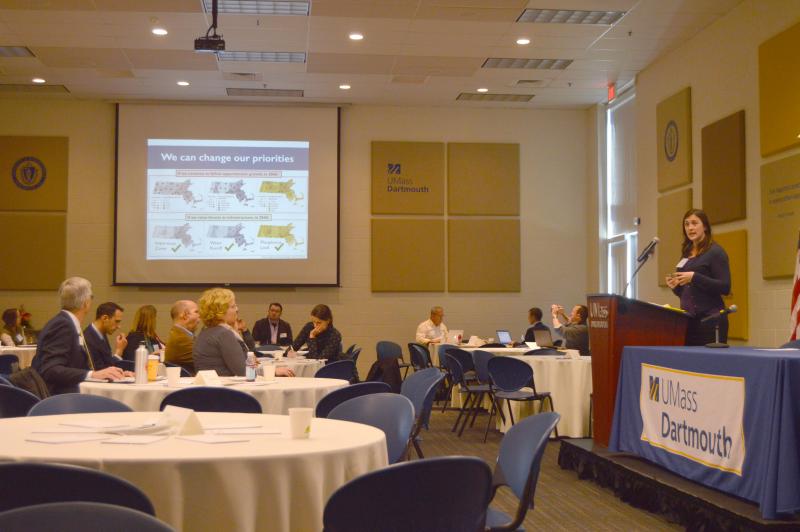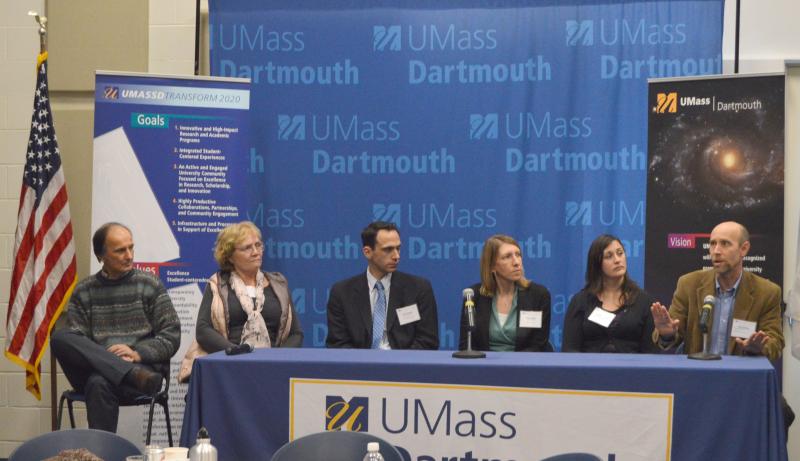UMass summit: climate change is 'about adaptation, not abdication'
Climate change is a multifaceted problem, and the solution will only be found by taking a multidisciplinary approach. That was the takeaway from UMass Dartmouth’s two-day climate summit.
GAEA, the Global Action and Education Summit, gave professors, local leaders and a variety of experts in the field a space to discuss the latest on climate change and how it’s impacting the planet and the Commonwealth. The event coincided with the international event COP21, the United Nations Conference on Climate Change.
The first day of the summit explored the science of climate change, reinforcing that the heightened level of carbon dioxide in the atmosphere is a human-caused phenomenon, and that it will have a long-term, deleterious impact on the planet if left unchecked.
Mark Altabet, dean of Estuarine and Ocean Sciences at the School for Marine Science and Technology (SMAST), said that many of the predictions about climate warming are already “baked into the cake.”
“There’s going to be a certain amount of global warming at this point,” said Altabet. “We have an idea from ice core records, which preserve bits of ancient atmosphere. The longest record is now almost a million years old. Over that time period, we see the amount of carbon dioxide in the atmosphere does vary with climate state. But it’s over a constant range.”
That range fluctuates between 180 and 280 parts per million.
“That means that if you have a million units of atmosphere, 180 of those bits of atmosphere is in the form of carbon dioxide. The rest is oxygen, nitrogen. A really small amount of the air is carbon dioxide, but it has a big impact on the climate of the planet,” said Altabet.
He said that when rates of carbon dioxide are high, the planet warms. Periods when carbon dioxide rates are low are periods where glaciers expand.
But now, carbon dioxide levels are nearing 400 parts per million – a number that will only increase with time as humans continue to add more emissions into the atmosphere.
The second day of the conference featured a range of representatives. The Southeastern Regional Planning and Economic Development District (SRPEDD), an organization that helps plan for the future of 27 different towns and cities in the state (Dartmouth included), and other organization representatives discussed the ways in which climate change is being addressed in the region.
Stefanie Covino of Mass Audubon discussed alternative ways of thinking about land development.
“Traditional, sprawling development gives you less open space, but there is a different way to do that. We want to help communities understand the conservation and development can actually work together,” said Covino.
She said that sprawling development leads to poor water quality, infrastructure damage, increased storm water issues and habitat loss. By clustering homes together, it will keep forests intact, which will help with water runoff. With the threat of sea levels rising on account of climate change, areas of low elevation would be most threatened by flooding.
Cathy Bozek, an aquatic ecologist at The Nature Conservancy, discussed culverts designed to withstand floods. If a culvert were to stretch across the width of a river, it would allow water and debris to pass through, mitigating possible damage during a flood event. While the initial investment for a wider culvert might be higher, she argued that the long-term costs outweigh the price tag.
“Plans don’t work unless you invest your time and effort into realizing them,” said Bill Napolitano, the environmental program director of SRPEDD. “One of the things that we can do is become static and complacent. In the context of climate change and resiliency, it’s going to be about adaptation, not abdication.”
Steven Lohrenz, dean of SMAST, said the summit was intended to be a starting point to build relationships between stakeholders and the people involved in climate change mitigation.
At the end of the two-day summit, Lohrenz said he was impressed with the efforts already being made to address climate change.
“We hear all these debates about climate skepticism, yet here you have people who are responsible for communities dealing with these issues now,” said Lohrenz. “That will make us better able to address these problems in the future.”















